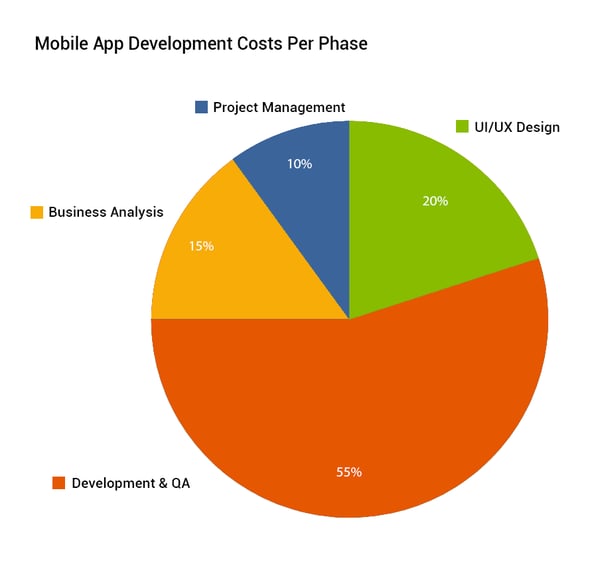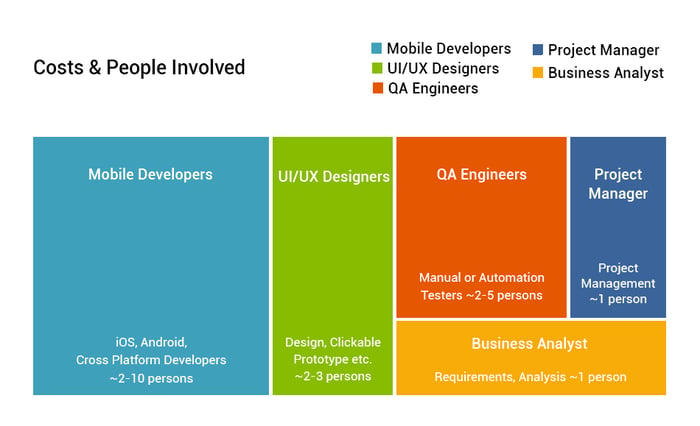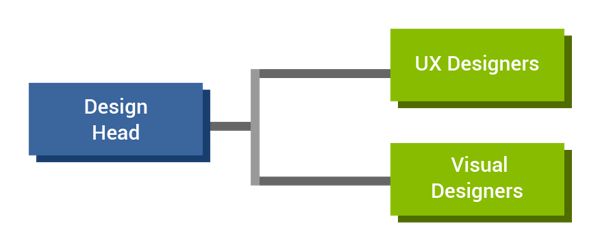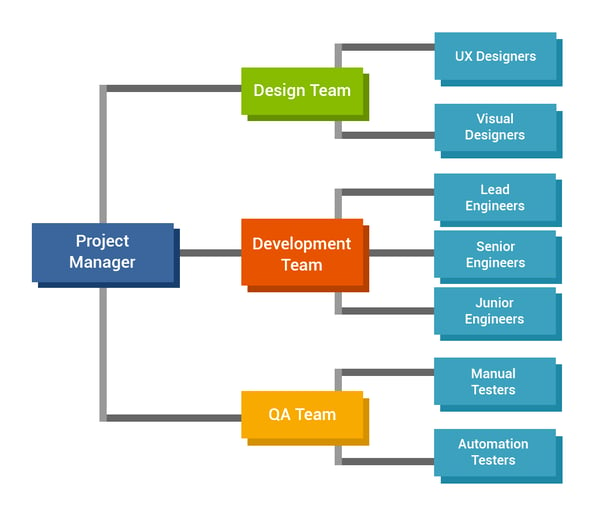Building Cost Effective Enterprise Mobile Applications
Mobile apps, designed to run on smartphones like Android or iOS-based phones, are ubiquitous in today’s enterprises. Every enterprise wants to build one or needs one. However, not everyone knows what it costs, or the efforts involved in building it.
In this blog, we will attempt to decode the costs & efforts involved in building an enterprise-grade mobile app. These apps are available through the native distribution platforms app stores such as Apple App Store, Google Play Store and other third-party app stores like Amazon Appstore or Samsung's Galaxy Apps. Some enterprises have internal app stores for employees and do not distribute the apps via the native app stores.
Based on the number and complexity of desired features, a decent enterprise-grade mobile app’s development and deployment cost anywhere between $25,000 to $500,000. This cost includes the effort of developing a single app for one platform: iOS or Android.
The app development cost and effort include the following items and activities:
- UX Design – Includes wireframes, assets & flow
- Business Analysis
- App Development & QA
- Integration of an app with a server backend like SAP, ERP, CRM, or any custom backend via Web APIs or SDKs
Excludes Development/Changes of a server component.
App Development Budget Per Phase


What Does Each Phase Include?
Business Analysis
Your inspired app idea needs verification, market analysis, and requirements documentation. An expert mobile development services provider like Innominds will ask you a variety of questions to prepare a precise app development estimate.Business analysts work/contribute in all phases of the app development project. Their tasks involve documenting requirements that:- are clear, consistent, and realizable to the developers
- follow the platforms best practices
- relies on the most effective technology stack for your requirement. Example: Native, Cross-Platform Native, Hybrid Web, etc.
Business analysis budget share in mobile app development cost can amount up to 15% of the total mobile application development costs.How to Optimize Business Analyst Budget?- Provide UML diagrams for the development team. UML is also used to generate code.
- If you have an alternate platform solution, use that as the base for the features.
UX Design
According to mobile app revenue statistics collected by Statista, mobile apps accumulated a total revenue of $88 billion in 2017. However, this value is estimated to be a monstrous $189 billion in 2020.This is a massive increase, butwhat’s hidden from the above statistic is the fact that 60% of apps have never even been downloaded, and 24% of apps that are downloaded are used only once. Moreover, 57% of apps are deleted within 30 days.Well, the harsh reality is that most apps don’t do well. The surge in mobile app revenue is because apps that do well, do very well, indicating that there’s a secret recipe to mobile app design that only a few are using. And, that secret recipe is UX Designing.As soon as the requirements document is ready, the first task is to start on the user interface. Faultless UI and UX are a prerequisite in today’s app development. A lot will depend on whether you have a corporate style guide, and usually, the design makes up to 20% of the total app cost. Innominds’ dedicated UX team develops not only the wireframes & UX design/flow, but also helps customers develop a clickable prototype using Industry standard tools like Sketch, InVision, Adobe XD, etc.Teams Involved A typical design team consists of a UX designer who designs the whole user experience. They focus on the logic and structure of the elements you see and interact with. Visual Designers / Graphics Designers, work on deciding how things should look. Their work involves choosing colors and fonts, as well as, to arrange elements (such as images and blocks of text) in layouts. These two members are usually led by the Design Head who does the sign off for the designs before submitting to the stakeholder.Once the design is submitted to the client, the designer’s work does not end there. There will be multiple iterations and changes to the design to incorporate individual ideas, corporate branding learnings, features, etc.How to Optimize UX Budget?
A typical design team consists of a UX designer who designs the whole user experience. They focus on the logic and structure of the elements you see and interact with. Visual Designers / Graphics Designers, work on deciding how things should look. Their work involves choosing colors and fonts, as well as, to arrange elements (such as images and blocks of text) in layouts. These two members are usually led by the Design Head who does the sign off for the designs before submitting to the stakeholder.Once the design is submitted to the client, the designer’s work does not end there. There will be multiple iterations and changes to the design to incorporate individual ideas, corporate branding learnings, features, etc.How to Optimize UX Budget?- As much as possible, use standard UI elements provided by Apple or Google
- Leverage screenshots from the apps you like, and you might get positively inspired by them
Development & QA
The most expensive phase of all is Development and QA. There are multiple tasks involved in Development & QA, which includes daily scrums, tracking of tasks, planning of deliverables & dates, and distribution of tasks efficiently. Enterprise app development is a collective effort and even a small app will need at least 2 -3 team members to develop it.A typical mobile development team is like any other software team and it consists of:- Project Manager
- Development Team
- QA Team
 The extended team could include:
The extended team could include:- Back End Developers
- Business Analysts
- Product Owners
- Other Module Project Managers
Since the team involved is bigger and the effort involved is larger, the Development & QA phase costs the most and is approximately 55% of the total budget.Cross-platform development frameworks like Xamarin can save up to 40% of the costs when building apps for multiple platforms.How to Optimize Dev & QA Budget?- Cross-platform development frameworks like Xamarin can save up to 40% of the budget for the next platform. The app must be simple and not graphic/animation intensive for you to take advantage of these app development platforms.
- Use standard / open source / subscribed mobile SDKs for some of the functionalities. For instance:
- Chat SDK for integrating a chat module
- SDKs for voice & video chatting or SMS verification
- SDKs for push notifications
- Networking Libraries
- Never buy app code templates from App Factories, if the developer doesn’t offer customization
- Reduce the expenses by supporting only the most used platform OS version. QA costs escalate with every version supported
- Make sure the requirements are documented, designed and signed off from all stakeholders before coding begins, as any new feature requests/changes can be expensive
- Go for Automation only when you are sure about the ROI
Project Management
Project Management is an essential part of any software development project. Project Management is the cog in the wheel of the entire team, managing delivery timelines, ensuring the quality of deliverables, adherence to KPI and SLAs. Usually, a Project Manager is responsible for the development process from start to finish. His/her efforts take up to 10% of the total app budget.How to Optimize Project Management Budget?- Never try to trim down the Project Management costs from the budget. Project Management will help you control costs and keep the project moving while ensuring quick and efficient communication between the different members of the extended team.
Exclusions- User License Costs – License costs involve costs for back-end systems. Example: User licenses for SAP, Oracle, etc.
- SDK License Costs – Involves license costs for integrating proprietary SDK into the mobile application. Example: Analytics SDKs like Pendo or AppAnnie.
- Software Licenses – Involves license cost for IDEs like Visual Studio/IDEA.
- App Store Deployment Costs - Cost of subscribing as a developer to the different native app stores. Example: $99 yearly for the Apple App Store and $ 25-lifetime cost for Google Play Store.
- Enterprise Mobility Management Costs – Involves the cost of Enterprise Mobility Management (EMM) licenses. EMMs are used to manage enterprise-wide security and app deployments internal to the enterprise.
- Mobile App Development Platform Costs – Mobile App Development Platform (MADP) allows connecting to enterprise systems like SAP, ORACLE, etc. MADP providers provide SDKs that can be integrated into the enterprise mobile app to fasten the development time. For example, they provide connectivity SDKs or WYSIWYG editors, etc.
Conclusion
Enterprises today are increasingly focused on providing seamless access to their highly mobile workforce. The rapid growth of enterprise mobile apps is, therefore, just a natural outcome of this. It is not surprising that there is always a growing backlog of mobile apps to be built and expectations to deliver faster than ever, and most importantly under the budget too. Technology and tools are evolving rapidly and making it complex to even get started, let alone deliver fast. The only way to rise above is to rely on a set of proven best practices for methodology, technology, design, performance, security, analytics and more. While these practices do not offer a silver bullet for all the challenges, they do provide the necessary framework to build enterprise-grade mobiles apps effective, on-time and under budget.
Comments
Product Engineering Services
App Modernization Services
Mobile App Development Services
Low Code Development Services